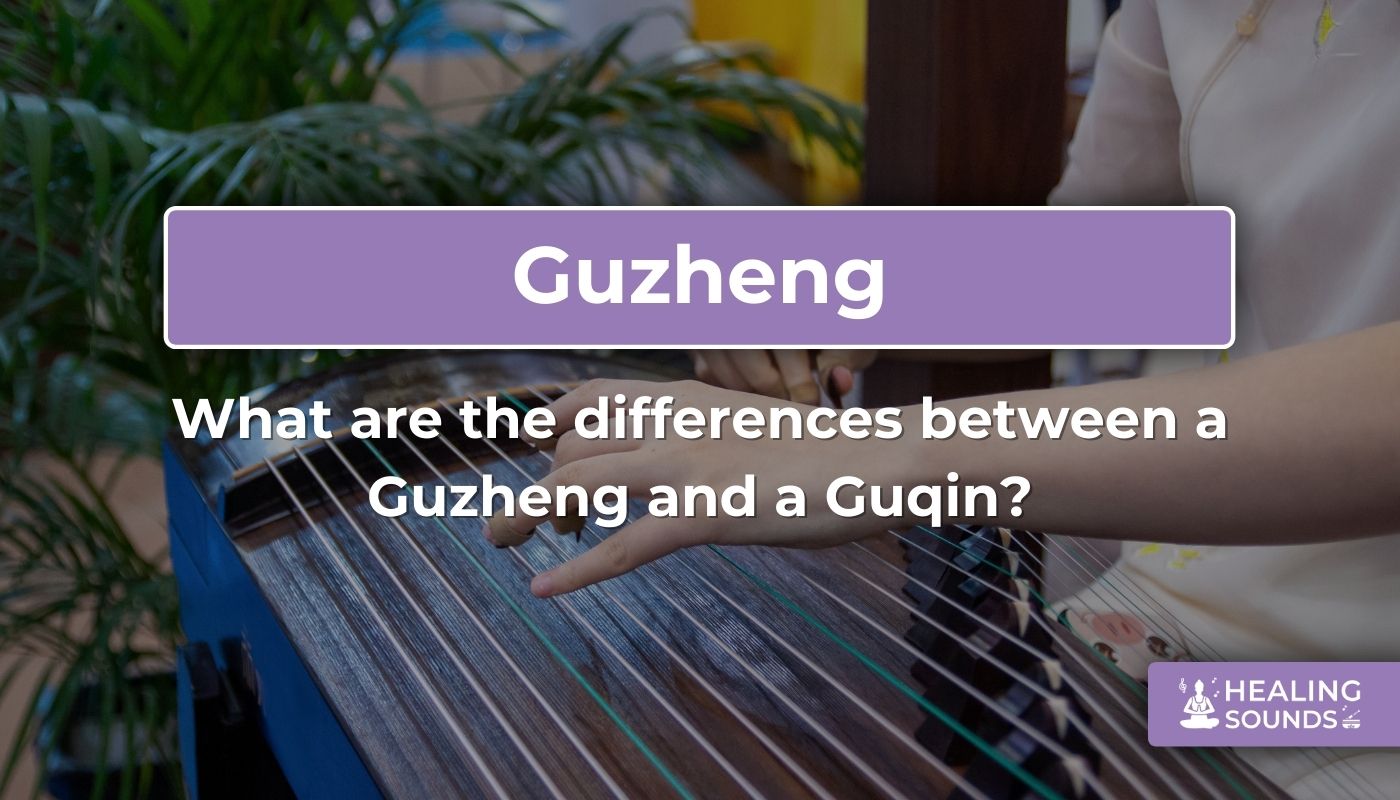Explorer la riche palette des instruments de musique traditionnels chinois nous amène souvent aux sonorités captivantes du Guzheng et du Guqin . Ces deux instruments à cordes emblématiques, chargés d'histoire et de signification culturelle, offrent pourtant des expériences musicales distinctes. Comprendre les différences entre le Guzheng et le Guqin est essentiel si vous êtes musicien ou passionné de culture et que vous cherchez à apprendre ou à intégrer ces magnifiques instruments chez vous. Ce guide compare Guzheng et Guqin , mettant en avant leurs caractéristiques uniques pour vous aider à choisir le Guzheng ou le Guqin qui correspond à vos aspirations. Quel chemin vous correspond le mieux : les mélodies vibrantes et fluides du Guzheng à 21 cordes ou les murmures profonds et méditatifs du Guqin à 7 cordes ?
Qu'est-ce que le Guzheng ? Une cithare chinoise résonnante
Le Guzheng (古筝) , souvent appelé cithare chinoise , est un instrument à cordes pincées dont l'histoire remonte à plus de 2 500 ans. Réputé pour sa sonorité évocatrice et polyvalente, le Guzheng moderne est généralement doté de 21 cordes tendues sur des chevalets mobiles (码子, mǎzi). Ces chevalets permettent un accordage précis et permettent des techniques comme le pitch bending et le vibrato, contribuant ainsi à l'expressivité de l'instrument.
Traditionnellement construit à partir de bois comme le paulownia pour la table d'harmonie, le guzheng est un instrument relativement grand, mesurant souvent environ 160 cm (63 pouces) de long. Sa sonorité est claire, résonnante et possède une large plage dynamique, convenant aussi bien aux passages délicats qu'aux mélodies puissantes et amples. Les musiciens portent souvent des onglets (义甲, yìjiǎ) sur une ou deux mains pour obtenir clarté et volume lorsqu'ils pincent les cordes.

Cithare chinoise en Paulownia Mini Guzheng de 32 pouces à 21 cordes
399,90 $ 519,90 $
Ce Guzheng compact à 21 cordes est parfait pour les débutants ou ceux qui disposent d'un espace limité, offrant le son traditionnel dans une taille portable.
Explorez ce mini-guzhengQu'est-ce que le Guqin ? Un instrument d'érudition et de sérénité
Le Guqin (古琴) , parfois appelé « l'instrument des sages », occupe une place encore plus ancienne et vénérée dans l'histoire chinoise, particulièrement associée aux érudits, poètes et philosophes. C'est un instrument plus calme et plus intime que le Guzheng, caractérisé par ses sonorités subtiles et profondes. Le Guqin standard possède sept cordes et est généralement dépourvu de chevalet. Les cordes sont tendues directement sur son corps long et fin, généralement en bois laqué (souvent du paulownia ou du sapin).
Jouer du guqin requiert un vaste répertoire de techniques, incluant différents types de pincements, de glissandi et d'harmoniques, produisant des sons allant des notes claires aux murmures éthérés. Sa musique est souvent décrite comme méditative et introspective, reflétant son utilisation historique pour l'épanouissement personnel et la contemplation plutôt que pour la représentation publique. Vous pouvez en apprendre davantage sur son histoire et son importance en consultant des sources faisant autorité comme Britannica .
Guzheng vs Guqin : différences clés
Bien que tous deux soient de magnifiques cithares chinoises , le Guzheng et le Guqin diffèrent sensiblement. Comprendre ces distinctions est essentiel pour choisir l'instrument qui correspond le mieux à vos intérêts.
| Fonctionnalité | Guzheng | Guqin |
|---|---|---|
| Nombre de chaînes | Généralement 21 (peut varier, historiquement moins) | 7 |
| Taille | Plus grand (environ 160 cm / 63 pouces) | Plus petit (environ 120 cm / 47 pouces) |
| Ponts | Ponts mobiles sous chaque corde | Pas de chevalets (sans frettes) |
| Volume et tonalité du son | Plus fort, plus brillant, résonnant, large plage dynamique | Plus doux, plus profond, plus subtil, intime, mettant l'accent sur les harmoniques et les slides |
| Technique de jeu | Utilise souvent des médiators, se concentre sur les mélodies et les arpèges | Pas de médiators, techniques de doigts complexes, concentration sur les nuances, les slides, les harmoniques |
| Association historique | Instrument folklorique populaire, divertissement de cour, performance d'ensemble | Instrument savant, méditation, développement personnel, rencontres intimes |
| Courbe d'apprentissage | Souvent considéré comme légèrement plus facile pour les débutants de produire des notes claires en raison des ponts et des positions fixes. | Courbe initiale plus raide en raison de la nature sans frettes et des techniques subtiles ; nécessite un placement précis des doigts. |
Son et style musical
Le son clair et résonnant du Guzheng le rend incroyablement polyvalent. Il excelle en solo, en ensembles traditionnels et même dans la musique fusion moderne. Sa capacité à produire des mélodies fluides (comme l'eau) et des effets dramatiques en fait un instrument captivant.
Le guqin , quant à lui, offre une palette sonore adaptée à l'introspection et aux environnements calmes. Sa dynamique subtile, ses harmoniques riches et ses sonorités glissantes créent une atmosphère de tranquillité et de réflexion profonde. La musique de guqin évoque souvent une conversation personnelle ou une méditation.
Apparence et construction
Visuellement, le Guzheng est souvent plus orné, avec ses éléments décoratifs, et ses chevalets proéminents lui confèrent une allure unique. Le Guqin , quant à lui, affiche une élégance plus simple et austère, souvent ornée de marqueurs incrustés (hui) indiquant les positions harmoniques, tout en conservant une surface lisse et dépourvue de chevalet.
Importance historique et culturelle
Bien que ces deux instruments soient anciens, le Guqin occupe une place unique parmi les « Quatre Arts » de l'érudit chinois. Il incarne les idéaux confucéens de raffinement et d'équilibre. Le Guzheng , tout en ayant des liens avec la cour, puise ses racines dans la musique folklorique et les divertissements populaires, gagnant en popularité au fil de l'histoire. Pour plus de détails sur l'histoire du Guzheng, consultez des ressources comme l'Encyclopédie Britannica .
Techniques de jeu et difficulté
Pour répondre à la question fréquente : « Quel est le plus facile, le Guzheng ou le Guqin ? » De nombreux débutants trouvent au départ plus facile de produire des sons agréables sur le Guzheng , car les chevalets aident à définir les notes. Cependant, maîtriser ses techniques avancées exige beaucoup de dextérité et de pratique.
Le caractère sans frettes du Guqin et la subtilité de ses techniques (notamment les glissements et les harmoniques) peuvent rendre l'apprentissage plus ardu au début. Obtenir l'intonation et les nuances expressives correctes exige de la persévérance et une oreille attentive. Aucun des deux instruments n'est facile à maîtriser, mais les premiers pas peuvent paraître plus simples avec le Guzheng pour certains.
- Guzheng : Potentiellement plus facile de commencer à jouer des mélodies de base grâce aux ponts.
- Guqin : Nécessite plus d'effort initial pour l'intonation et les techniques subtiles en raison de sa conception sans frettes.
- Les deux nécessitent un dévouement à long terme pour être maîtrisés.
Découvrez notre sélection de Guzheng

479,90 $
619,90 $
Un guzheng portable à 21 cordes offrant une excellente qualité sonore, idéal pour les débutants comme pour les joueurs expérimentés. En savoir plus ➔

529,90 $
689,90 $
Cette cithare chinoise compacte allie portabilité et richesse sonore, idéale pour voyager et s'entraîner où que vous soyez. En savoir plus ➔
Découvrez un son plus ample avec ce Guzheng en bois de paulownia, plus grand, idéal pour les étudiants et les musiciens plus expérimentés. En savoir plus ➔
Quel instrument choisir ? Guzheng ou Guqin ?
Le choix entre Guzheng et Guqin dépend en fin de compte de vos objectifs personnels, de vos goûts musicaux et de l'expérience que vous recherchez.
Choisissez le Guzheng si :
- Vous êtes attiré par des sons plus brillants, plus résonnants et des mélodies fluides.
- Vous envisagez de jouer pour d’autres ou dans des ensembles.
- Vous préférez un instrument avec une courbe d’apprentissage initiale potentiellement plus douce pour les notes de base.
- Vous aimez le travail des doigts complexe et l’expression dynamique.
Choisissez le Guqin si :
- Vous recherchez un instrument calme et méditatif de réflexion personnelle ou de détente.
- Vous appréciez les nuances subtiles, les harmoniques et les tons glissants.
- Vous êtes fasciné par ses profondes connexions historiques et philosophiques.
- Vous êtes patient et dévoué à maîtriser ses techniques uniques et intimes.
Tenez également compte de votre environnement. Un guzheng nécessite plus d'espace et produit plus de volume, tandis qu'un guqin est plus adapté aux environnements plus petits et plus calmes.
Conclusion
Le Guzheng et le Guqin sont des instruments extraordinaires qui ouvrent des fenêtres sur le riche patrimoine musical de la Chine. Le Guzheng captive par son énergie vibrante et sa polyvalence, ce qui en fait un choix populaire auprès des musiciens comme des apprenants. Le Guqin, quant à lui, séduit par sa profonde sérénité et sa profondeur historique, propice à l'introspection et à la contemplation silencieuse.
Comprendre les différences fondamentales entre le Guzheng et le Guqin – en termes de sonorité, de structure, de technique et de contexte culturel – vous permet de prendre une décision éclairée. Quel que soit votre choix, explorer l'un ou l'autre instrument vous promet une exploration enrichissante du son et de la tradition. Chez Healing Sounds , nous proposons une sélection soignée d'instruments traditionnels de haute qualité, dont divers Guzheng, pour accompagner votre cheminement musical.
Questions fréquemment posées sur Guzheng et Guqin
De nombreux débutants trouvent le Guzheng légèrement plus facile à utiliser pour produire des notes claires grâce à ses chevalets mobiles. Cependant, le Guqin , sans frettes, exige une plus grande précision initiale pour l'intonation. Ces deux instruments requièrent un engagement important pour maîtriser les techniques avancées.
Oui, des cours virtuels de guqin et de guzheng sont largement disponibles. De nombreux professeurs proposent des cours en ligne via diverses plateformes, permettant ainsi d'apprendre ces instruments traditionnels partout dans le monde.
Apprendre un instrument en autodidacte présente des difficultés. Comparé à l'erhu (un instrument à archet exigeant une intonation et une technique d'archet précises), le guzheng peut être considéré comme légèrement plus accessible aux débutants en raison de sa hauteur fixe (par corde) grâce à ses chevalets. Le guqin, quant à lui, présente des difficultés avec sa conception sans frettes et ses techniques subtiles. Des cours structurés sont généralement recommandés pour progresser plus rapidement sur ces trois instruments.
Oui, si le guqin est emblématique des représentations d'érudits ou de personnages historiques, le guzheng est également fréquemment représenté dans les médias chinois, souvent associé à des personnages féminins, des spectacles ou des scènes folkloriques. D'autres instruments comme le pipa (luth) et l'erhu (violon) sont également fréquemment utilisés.
En général, le Guzheng est considéré comme potentiellement plus facile à utiliser pour les débutants que le Guqin pour produire des sons de base. La conception sans frettes du Guqin et l'accent mis sur les techniques subtiles exigent souvent un entraînement auditif initial plus poussé et une plus grande précision des doigts. Cependant, la maîtrise de l'un ou l'autre instrument exige un dévouement considérable.


